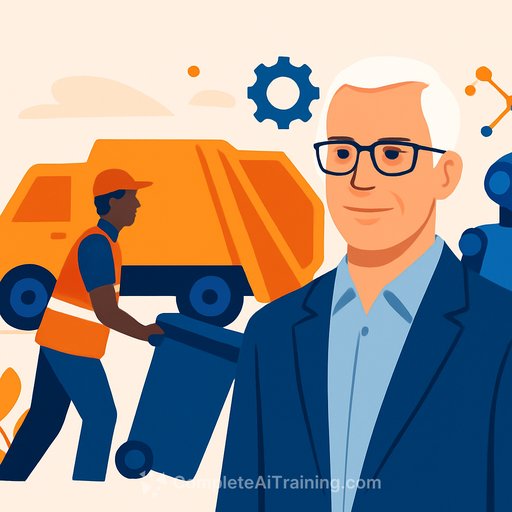Waste Management CEO Prioritizes People Amid Automation and AI Expansion
Jim Fish, CEO of Waste Management (WM), puts people at the center of leadership even as the company increases automation and AI use. His approach focuses on employee engagement, safety, and sustainable growth, balancing technology integration with respect for the workforce.
A People-First Leadership Approach
Fish maintains a hands-on leadership style, regularly connecting with employees at all levels, including frontline waste collectors. This personal engagement fosters loyalty and reinforces a culture that values respect and dignity. He believes that consistent, genuine interaction builds a stronger, more committed team, regardless of the physical demands of the roles.
Automation with Careful Transition
Waste Management is shifting from rear-loader trucks, which require workers to ride on the back, to automated side-load trucks. This change aims to improve safety and operational efficiency. The company plans to reduce about 5,000 jobs by 2026 through natural attrition rather than layoffs, focusing on retraining employees for less physically demanding roles.
Fish stresses that automation and AI should not threaten short-term job security but instead open opportunities for new job categories. He points to historical precedents where technological advances created new industries and roles, encouraging confidence in future workforce changes.
Sustainability as a Business Priority
For WM, sustainability is both an environmental responsibility and a profitable business strategy. Recycling delivers the company’s second-highest return on invested capital after commercial waste. Investments in advanced recycling facilities enhance sorting efficiency and reduce landfill use.
Additionally, WM captures landfill gas to produce renewable energy, powering parts of its natural gas truck fleet. This creates a circular system that supports environmental goals while driving economic value.
Collaboration with Regulators
Fish highlights the importance of working closely with state regulators, especially in progressive regions like California, Oregon, and Washington. WM actively participates in shaping recycling and waste management policies, often providing suggestions that local governments welcome to improve programs.
Leadership Rooted in Empathy and Resilience
Fish attributes his leadership style to early business experiences and overcoming a serious illness in college. These shaped his values of patience, resilience, and empathy. He emphasizes showing genuine care in everyday interactions, such as greeting employees warmly, to build trust and engagement.
Looking Ahead: Jobs, AI, and Sustainability
While acknowledging the risk of job displacement from AI and automation, Fish is optimistic about the future workforce. He believes new opportunities will emerge in sustainability and autonomous technology sectors. His message to managers is clear: prioritize people and culture to successfully manage change and unlock new potential.
- Leadership Tip: Engage with employees regularly and authentically to maintain morale during transitions.
- Safety Focus: Use automation to reduce workplace risks, not just cut costs.
- Sustainability: Integrate environmental goals with business profitability for long-term success.
- Regulatory Engagement: Collaborate with policymakers to shape feasible and effective environmental programs.
For management professionals interested in integrating automation and AI while maintaining a people-first culture, exploring specialized training can be valuable. Resources like Complete AI Training offer courses on automation, AI tools, and leadership strategies to navigate workforce changes effectively.
Your membership also unlocks:






